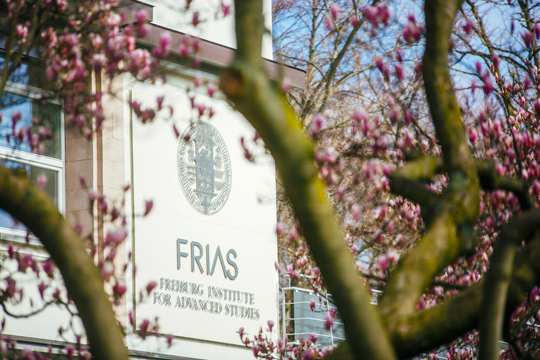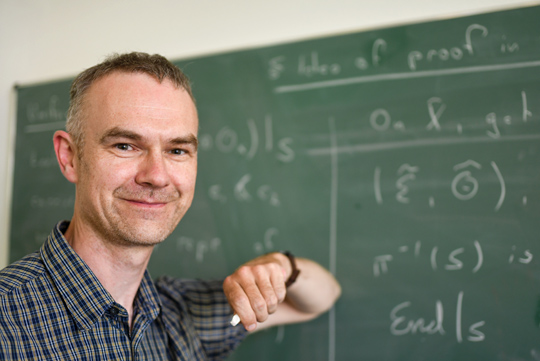Time and space for research
Freiburg, Jul 31, 2018
The Freiburg mathematics professor Stefan Kebekus has been a fellow at the Freiburg Institute for Advanced Studies (FRIAS), the international research college at the University of Freiburg since October 2017. Together with Prof. Dr. Annette Huber-Klawitter and Prof. Dr. Wolfgang Soergel at the Mathematical Institute, he is director of the FRIAS research focus “Cohomology in Algebraic Geometry and Representation Theory.” In the past ten months, the team has brought together more than 45 mathematicians specializing in geometry, algebra, number theory and representation theory from Freiburg and around the world for expert discussions. In July 2018, the funding ends. Sophie Baar sat down for a chat with Kebekus to ask how he has benefited from the fellowship.

The Freiburg Institute for Advanced Studies offers four funding programs. Photo: Sandra Meyndt
Mr. Kebekus, why did you apply for the FRIAS fellowship?
Stefan Kebekus: I have been working with Annette Huber-Klawitter and Wolfgang Soergel since 2012. At that time, we jointly acquired the funding of a research training group from the German Research Foundation. Of course, our focus has always been on training junior researchers. We ourselves have little time to work together on a research project or a question. We wanted to change that. Our goal was to bring together our expertise in the different areas of mathematics and to exchange ideas with international researchers.
What were you able to accomplish during your time at FRIAS?
Firstly, the funding gave us the time and space we needed, something that is particularly essential in mathematics. In mathematics, funding is often associated with a great deal of administrative work, so that after successfully receiving it, I often have less time for the actual research than before. At FRIAS it’s different. Here I have been able to focus on my own research in recent months. In many long conversations with my colleague Florian Ivorra from the Université de Rennes, I learned a lot about Hodge modules, which has greatly advanced my own research. In normal university life such a thing is often not possible. The FRIAS has assisted us with the administration and especially the care of the guests, many of whom have already mentioned that they would like to come back.

A FRIAS Fellowship can make many things possible: Stefan Kebekus appreciated not only the time and space to work, but above all the collaboration with leading international researchers. Photo: Patrick Seeger
What is in the cards for you and your research project now?
I will continue to work with many of the researchers who visited us beyond the funding period. In addition, we are currently in discussion with colleagues from Basel and Strasbourg and would like to further expand our cooperation.
Apply now
Researchers at the University of Freiburg are invited to apply by October 31, 2018 for four funding programs for the 2019/20 academic year.
● Senior Fellowships are offered for a duration of ten months. The scholarship provides a fifty-percent reduction in your teaching load that FRIAS will finance with up to 27,000 euros.
● Junior Fellowships are offered for a duration of ten months. The scholarships include a teaching load reduction that is financed through FRIAS with up to 16,000 euros.
● Junior researcher conferences take place between September 2019 and April 2020 at FRIAS, which will support them both from an organizational and a financial perspective with up to 8,000 euros.
● Project groups are funded for a duration of 12 to 15 months to enable professional collaboration during the early research stages. Each project group receives 20,000 euros and organizational support.
International researchers, regardless of their nationality and field of research, may also apply until 15 September 2018 for the Marie S. Curie FRIAS COFUND Fellowship Programme (FCFP).

